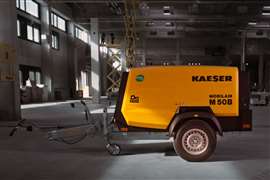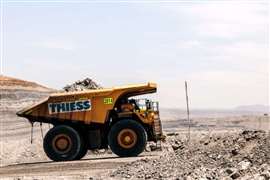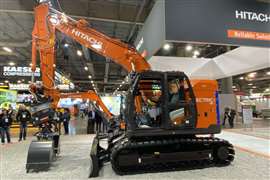Middle East recovery spells opportunity for rental companies. Murray Pollok reports.
11 November 2011

Qatar may be in the headlines following the news that it will host the 2022 World Cup, but rental managers in the region tell Murray Pollok that most of the rental action is currently elsewhere.
Chris Nixon tells IRN that his rental company Nixon Hire was so busy in the UK in the years before the crisis that it delayed a long-held plan to set up a rental business in Dubai. "We were very close to setting up there", he says.
Luckily, by the time Nixon was ready to move it was clear that Dubai was not quite the opportunity it had once been, and instead the company shipped its first five containers of equipment to Doha, Qatar in early 2010.
That good decision became a great one last December when Qatar was named as the host nation for the 2022 World Cup, bringing with it enormous additional investments in stadia and supporting infrastructure.
"The World Cup will help us - it's a massive boost," says Mr Nixon, "but there is lots to do even without the World Cup."
Nixon Hire isn't the only western rental company to come knocking on Middle East doors. GAM, Hertz, Speedy Hire and Streif Baulogistik are among others who have spotted the opportunities, and some, like Aggreko, have been there for years.
The region is now firmly back on the agenda for rental companies looking for new rental business, but where do these opportunities lie?
Offering a broader perspective on the Middle East rental market - and Qatar - is Graeme Clack, chief executive officer of Dubai-based Byrne Equipment Rentals, a company established in the region in the early 90s and since 2007 owned by HSBC Private Equity.
"Qatar is strong, but relatively small", says Mr Clack, who joined Byrne at the time of the private equity takeover, "Everyone has World Cup fever, but that is going to take time to come to market. Anybody rushing for a pot of gold is mistaken - it will take a number of years. I think people need to be much more realistic about the market."
Agreeing with this perspective is John Ashcroft, general manager of Dubai-based Manlift Group, which is majority owned by the Netherlands Riwal Group and rents both aerial platforms and power in the region. It employs 150 people and operates from four bases: Dubai, Abu Dhabi, Qatar and, since last year, New Delhi in India.
"Qatar is busy holding its breath", Mr Ashcroft tells IRN, "There is a good potential level of activity, but it's still going through the planning stages. Implementation hasn't started yet. In the meantime, people are piling into the market."
In the aerials sector he says most renters are running at decent utilisation levels, so oversupply not yet a big problem. However, it is not a story of unlimited opportunity. Some large ongoing projects in Qatar, such as a massive expansion of Doha Airport, will be coming to an end within 18 to 24 months, and the aerial platforms used on that project - currently more than 200 - will then need to find other jobs.
Qatar's limitations are a function of its size - the population, after all, is around 1.7 million, of which the vast majority are immigrant workers.
Chris Nixon tells IRN that over the past decade he has watched Dubai create a world class infrastructure; "That's all to come in Doha. There is a monorail system, it has the second largest gas reserves in the world, and there is a super-fast railway from Turkey."
In fact, Mr Nixon says that the World Cup has actually put a temporary brake on development, because the government has had to go back to the drawing board to re-prioritise its projects list in the light of the World Cup win.
"It [project start-ups] won't happen overnight, but I think it could be the end of next year," says Mr Nixon.
Offering much wider opportunities is Saudi Arabia. "The most activity is very clearly in Saudi Arabia", says Byrne Equipment's Mr Clack, "The market is strong and has inherent demands - a big population, infrastructure needs, manufacturing industries. What people in Europe would recognise as traditional market, and it has oil and gas...Saudi Arabia is the real opportunity."
Byrne, which runs three divisions for tools, events and general equipment rentals and has rental revenues estimated by IRN at around US$60-80 million, now has four depots in Saudi including a new one in Riyadh; "Certainly we will need another two or three locations, and we might get up to 10 in time."
Manlift's John Ashcroft says Saudi Arabia "is now starting to become a bit more exciting [for aerials]...it has difficulties, but holds opportunities for us. We'll probably try to open there in the next 18 months to two years."
He also sees opportunities for power rentals in Saudi, although investment in the fleet will be required for that to happen. That investment has been forthcoming so far in its five and a half year life. With the financial backing of Riwal, it has established an aerial platform fleet of approximately 1000 aerial platforms and a power fleet of 150 MW. Although run as an autonomous business, Mr Ashcroft said Riwal "continues to be an excellent partner - providing support in many ways".
Of course, both Manlift and Byrne are headquartered in Dubai and were heavily involved in the city's boom years. Both are now adjusting to the new business environment.
Byrne's Graeme Clack will surprise some people when he says that "there are still a lot of good industries in Dubai. There are good logistics businesses, excellent retail and hotel businesses. Companies like ours have had to adjust. Five years ago it was a utopian time." Dubai now represents significantly less than half of the company's revenues; "It's still an important part, but no more than Abu Dhabi of Saudi Arabia or Qatar."
At Manlift, John Ashcroft tells IRN that the once-rampant Dubai economy is in the process of solving its problems; "As it gradually untangles itself financially we will get to a place where projects are completed, then we'll start to see new projects come on line.
"In the next two to three years we will start to see some increasing activity, but not at the same level as before." He points to a lot of talk about a $7.7 billion project at the Dubai airport; "that's a most encouraging sign."
The downturn in Dubai saw a lot of attention turned to Abu Dhabi. Mr Ashcroft says the market for aerials in Abu Dhabi stopped in October 2009 but has since recovered to a "good level of activity...You get companies from Dubai moving equipment to Abu Dhabi, or Saudi. So there is no shortage of equipment, and a high level of activity, but it's not growing. It's a more mature market."
At Byrne, Graeme Clack is very positive; "Abu Dhabi is now much stronger than Dubai - it has strong oil and gas and construction sectors, and events is growing there as well. The government made some big investments, and that attracted a lot of people and events."
Both Byrne and Manlift have their own strategies. Manlift is now exploiting the growing market for aerials in India, with a depot established in New Delhi last year. However, for the power market, the plan is to expand its power rentals business by targeting new markets outside the United Arab Emirates (UAE).
In just a few years the company has created a power fleet totalling 150 MW, comprising under 500 kVA gensets for smaller projects and 800/1250 kVA units for major power projects and international jobs.
John Ashcroft says that a sizeable chunk of this fleet is now based outside its core markets of Dubai, Abu Dhabi and Qatar; "About 50% of our large units are now outside our existing Middle East areas, in Africa or other Middle East countries."
He says Manlift will continue to invest in its power fleet as markets in the region recovers, but that the best opportunities are not in Qatar or the UAE because "there are simply too many generators".
Manlift sees greater potential for its power business elsewhere, including Saudi Arabia. "We will expand our fleet over the next 6 to 12 months, definitely", he says.
Last year the company completed its largest power rentals project, installing a 27 MW plant for the Gulf Cement Company (GCC) in Qatar. Most of the gensets were Cummins 1250kVA Powerbox units. The company's fleet also includes Ingersoll Rand branded units from Doosan Infracore.
For Byrne, the key to the last few years has been diversification. Five years ago, 70% of Byrne's activities were in construction; it is nearer to 30% now. "It's a big improvement. We have lots more exposure to oil and gas, major events, hotels, logistics. It's a much better balance."
It also continues to expand its geographical coverage in the Gulf Cooperation Council (GCC), whose members are Bahrain, Kuwait, Oman, Qatar, Saudi Arabia and UAE. It started working in Oman in 2009 and established a firmer footing there last year. "For us it was about offering GCC coverage - it was a logical extension."
Also significant is a re-rental partnership with Algeco Scotsman units across the UAE, re-renting its 4000 KD flexible modules and the Batex temporary warehouse units. "Our traditional unit tended to be a finite building", says Mr Clack, "Algeco's modulars will be a shop today and classroom tomorrow. It gives us more opportunity to support bigger buildings."
He won't discuss whether that agreement will be expanded to Saudi Arabia, but says he is encouraged by the start that has been made; "We obviously have considerable aspirations for the product."
Power is already part of the Byrne business it completed a 27 MW project in Qatar last year using gensets supplied by India's Sterling Generators, using MTU and Volvo engines. It dabbled with heavy machinery rentals a year or so back, but these machines were re-rented and Byrne has since left that market.
For Mr Clack, there are plenty of opportunities in the Middle East, despite the new entrants, about whom he manages to be reasonably welcoming; "It's a double-edged sword: they come with professionalism - and in some ways that helps - but they also bring a greater degree of competition."
Also, he will also resist the temptation to endlessly chase the mega projects that are in the public eye. "I'm trying more and more not to focus on big projects. Everyone is chasing them. We want to be part of that, but we're looking for long term partners in industries like logistics and facilities management. These customers have longevity."
BOX STORY
The Nixon plan
Nixon Hire opened up in Doha, Qatar last year with the same three divisions that it has in the UK, which means general plant/tools, portable toilets and modular accommodation.
After a year getting red tape sorted out and finding a local sponsor, the business really found its feet when Nixon sent out one of its experienced employees, Frank McMahon, as operations manager. Revenues are expected to triple this year.
A new country manager, ex-Aggreko employee Chris Britt, will take up his post in September to further boost the team.
With Doha attracting many high profile sporting events Chris Nixon, Nixon Hire's managing director, says the business will target work not only in construction, but also events. For that reason the fleet includes products such as generators and fencing.
Around 60% of the 200 unit fleet comprises used machines from Nixon's UK fleet, and this is one of the strategic reasons behind the Doha business. "The ultimate plan is to have an inroad for us to dispose of our UK fleet, run for another year or so in our Middle East fleet and then dispose into Africa, India and Asia, and not in our backyard", says Mr Nixon.
And longer term, does he have ambitions to expand into other Middle East countries? "We've just got ourselves set-up in Qatar", he says, "At present it would be foolish [to go elsewhere] when we haven't even scratched the surface in Qatar."
BOX STORY
Zahid invests in
Saudi rental fleet
Caterpillar dealers such as Al Bahar in the UAE and Zahid Tractor in Saudi Arabia have played a big part in developing rental in the Middle East, and continue to do so.
Yalcin Kurt, rental and used equipment manager of Zahid Tractor in Saudi Arabia, tells IRN that the total size of the rental fleet could already be as much as US$0.5 billion; "We expect to grow that to $1 billion in a couple of years."
Of course, with that kind of investment it is clear the Zahid's rental interests include very large Caterpillar machines as well as the smaller equipment typically rented in Cat Rental Stores.
Zahid Tractor actually runs three rental divisions: the longest established is the power rental operation, with a fleet valued at $200 million; there is a Cat Rental Store operation for smaller Cat and allied equipment; and the third is Heavy Rents, which deals with the bigger machines. Zahid rents from all 14 of its locations in the Kingdom.
Does Zahid target the large projects with its rental operation? In fact, says Mr Kurt, the mega projects are often carried out by major contractors who buy equipment for the duration of the job. Rather, he says Zahid benefits from renting to the many smaller projects taking place all over the country.






